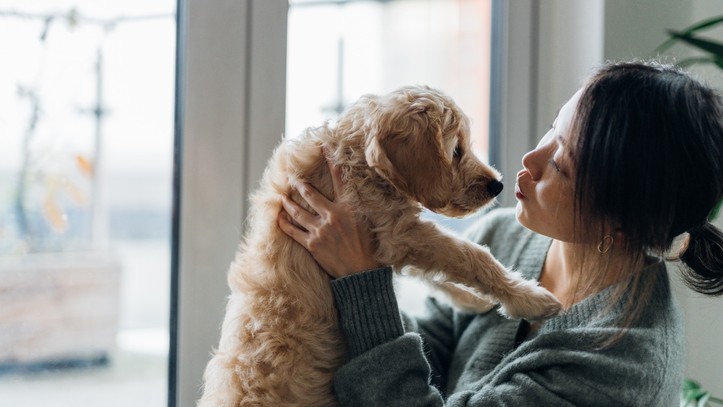How to help a puppy with hiccups
Does your furry young friend keep getting hiccups? Here’s how to help a puppy with hiccups

Get the best advice, tips and top tech for your beloved Pets
You are now subscribed
Your newsletter sign-up was successful
When you’ve just taken on a new puppy, it can feel like you have lots to think about. If you’re particularly organised, you probably have numerous lists relating to what you need to buy and reminding you to register with a veterinarian and change their microchip details.
So, while you’re buried in a pit of information about new puppy advice, like how to potty train your puppy and which is the best puppy food, you notice that your pup has hiccups… Just what you need, another thing to worry about, right? Well, maybe not! Read on to find out why puppies get hiccups and how you can help your puppy with hiccups.
- Best puppy toys: The best toys for keeping your pooch amused
- Best puppy treats: Reward your young dog in style
- Best puppy food for small breeds
Why do puppies get hiccups?
Hiccups occur when the diaphragm goes into spasm and twitches, causing some air to rush out of the lungs. When the diaphragm returns to its normal position, air is drawn in, which forces the glottis cartilage in the throat to swing shut. The exact reason why people and dogs hiccup is unknown, but it’s thought to be made worse by eating and drinking too quickly or being overtired or excited. This might be because swallowing air is believed to be a potential trigger for hiccups.
For some reason, babies and young animals seem more prone to hiccups, and this might be because, in the womb, foetuses often hiccup as a way of experimenting with their breathing muscles. So, if puppy hiccups could be related to eating or drinking too quickly, you might be thinking, ‘How much should I feed my puppy?’ And you can find more advice if you follow the link.
- How to stop a puppy chewing
- How much sleep does a puppy need?
- How to play with a puppy: Tips and advice from a vet
Are puppy hiccups normal?
Thankfully, puppy hiccups are very common and usually nothing at all to worry about. You might notice it more often if your pup has guzzled a big meal or is especially hyper because you’ve returned home. These are all totally normal reasons for hiccups. However, if ever your pup seems unwell or develops other symptoms as well as hiccups, it’s best to speak to your veterinarian for some reassurance.
How to help a puppy with hiccups
Before you start to panic about your pup’s hiccups, remember that it’s very common and usually nothing to worry about. Like humans, dogs can get hiccups from time to time, and they should disappear on their own.
You can safely ignore some of the methods for curing hiccups in humans. After all, it’s unlikely that you’ll be able to communicate to your puppy that you need them to hold their breath. Similarly, even dogs with an impressive repertoire of tricks would struggle to drink backwards from a glass of water! Trying to scare your pup is off the cards too – although this is thought to cure hiccups in humans, it’s only likely to cause your puppy to become distressed.
Get the best advice, tips and top tech for your beloved Pets
- Puppy food aggression: Six tips to stop it
- How to stop a puppy biting
- A vet’s guide to puppy shots
So, with so many things that you can’t try, how can you help your puppy with hiccups?
Now that you know hiccups could be caused by eating or drinking too quickly, overexcitement, or tiredness, you might look into changing your pup’s diet. However, there’s no evidence that certain brands of dog food or raw diets for puppies will make your pup eat more slowly or prevent hiccups. It’s worth using a puzzle feeder or other slow feeder to make sure your dog doesn’t guzzle their food. Offering food and water from a raised bowl will stop your pup from swallowing too much air. Both of these methods might help to prevent hiccups.
If you want to try and give your dog some relief from their hiccups, you could try offering them small amounts of water to lap. Relaxation can also help, so trying to share a moment of quiet, calm cuddles might help the hiccups subside. If your puppy has hiccups that last for longer than a few hours, or if they develop any signs of breathing distress, it’s worth calling your veterinarian for some advice.
Summary
If you have a new pup, it’s a lovely and exciting time. Introducing a new furry family member to your home is wonderful. However, with the responsibility of being a pet parent comes a natural tendency to worry. It’s completely normal to wonder whether a change in behaviour or a symptom like hiccups is a sign of something more serious. Although it’s important to speak to your veterinarian for reassurance if you have concerns, hiccups are very common in young puppies, and thankfully, they are usually nothing to worry about.
Dr Hannah Godfrey is a small animal vet who graduated from the Royal Veterinary College in 2011 and began work straight away at a busy mixed practice. Initially, she treated all species, but focussed on small animals from 2014. She has a passion for soft tissue surgery, ultrasound, and canine and feline dentistry, having completed additional training in these areas.

